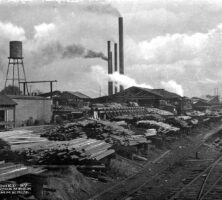Henry Tift was a businessman and developer who founded the city of Tifton. As civic leader and benefactor, he contributed for a half century to the industrial, agricultural, financial, religious, and educational growth of his city and to the well-being of its citizens.

Courtesy of Coastal Plain Experiment Station
Often called”the Captain” from his early seafaring days, Henry Harding Tift was born in Mystic, Connecticut, on March 16, 1841. He was the oldest of seven children born to Phoebe Harding and Amos Chapman Tift. His father was a businessman in Mystic and in Key West, Florida. After graduating from Connecticut’s Greenwich Academy in 1859, Tift apprenticed as a machinist and worked as a steamship engineer on a shipping line between New York and the Gulf Coast.
In 1870 Tift became general manager of a manufacturing firm owned by his uncles, Nelson Tift and Asa Tift, in Albany, Georgia, and in 1872 he purchased a large tract of pine forest in nearby Berrien County, along the newly completed Brunswick and Western Railway. There, on the highest ground south of the fall line at Macon, Tift established a sawmill and a village for his workers. Eventually he expanded into turpentine and barrel-making operations and turned his barren timberlands into farms for cotton, corn, livestock, fruit, tobacco, pecans, and sweet potatoes. When the Georgia Southern and Florida Railway intersected the Brunswick and Western at Tift’s mill in 1888, the settlement was connected to Atlanta and became a boom town. It was incorporated as Tifton by an 1890 legislative act. It became the county seat of Tift County, which was carved out of Berrien, Irwin, and Worth counties in 1905.

Courtesy of Hargrett Rare Book and Manuscript Library, University of Georgia Libraries.

Courtesy of Hargrett Rare Book and Manuscript Library, University of Georgia Libraries.
Tift provided employment and financial growth opportunities for his flourishing market center by founding the Tifton Cotton Mill and the Bank of Tifton. Other types of businesses in which he had a leading interest included fruit-growing, groceries and general merchandise, cottonseed oil, lumber, brick and stone, and several railroads, all essential for the development of a region. Tift also established a model farm north of town and donated a large acreage, called Cycloneta (after a tornado that had swept through the spot) for an agricultural experiment station. These enterprises led eventually to the development of the Abraham Baldwin Agricultural College and the Coastal Plain Experiment Station (later University of Georgia Tifton campus). His civic commitment was most evident in his donation of lands for churches ( Methodist, Baptist, and Episcopal) and Fulwood Park (named after his legal advisor) and in his decades of service as a city councilman.
In 1885 Tift married Elizabeth”Bessie” Willingham, whose father had sold him his first sawmill equipment. Bessie’s active involvement in civic organizations complemented her husband’s development enterprises, and she encouraged his philanthropy. A graduate of Monroe Female College in Forsyth, she persuaded him to make large and frequent benefactions to the school. After he saved it from bankruptcy, the trustees changed its name to Bessie Tift College in 1907. She also secured his support for Tallulah Falls School in northeast Georgia. The Tifts had three sons, Henry Jr., Thomas Willingham, and Amos Chapman.
Through a variety of business and civic undertakings, Henry Tift contributed significantly to the economic and social development of south central Georgia. Though a captain of industry, agriculture, and finance, he is best remembered for his civic service and generosity. After a stroke, Tift died on February 4, 1922, and was buried in Mystic, Connecticut.











